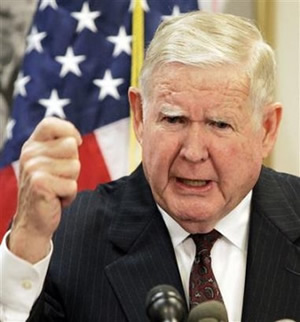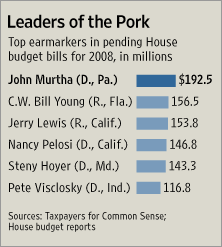Domestic Politics Hamstrings Iraq Policy
Public opinion polls showing Americans overwhelmingly frustrated with the war in Iraq and ready to begin withdrawal. Paradoxically, domestic political considerations are making it impossible to move off the status quo.
John Murtha blames the Republican primaries:
Rep. John Murtha predicted Monday that Democrats will not be able to pass any meaningful legislation to end the Iraq war until presidential primary elections are over next year. Murtha, a Vietnam veteran and war critic who chairs the appropriations subcommittee overseeing defense spending, conceded that not as many Republicans had broken with President Bush as many Democrats had predicted. “As soon as the primaries are over, you’re going to see Republicans jumping ship,” Murtha, D-Pa., said in a speech at the National Press Club.
Matt Yglesias blames the Democrats: “Not only are Democrats afraid of taking certain kinds of political risks to end the war, but they see no prospect of a political upside to ending it.”
Kevin Drum expands on that analysis:
Not only are there fewer upsides than downsides, but the upsides are vague and fuzzy while the downsides are sharp and terrifying and potentially career-ending. This is the underlying dynamic that will probably keep us in Iraq essentially forever, no matter who we elect president. It’s all very discouraging.
Jim Henley quips that this is “why the libertarian critique of the state still makes sense to people.”
Really, though, this is simply the nature of our system of separation of powers and checks and balances. The Framers created a system that makes it really hard to change policy without broad consensus and extra-constitutional measures like the filibuster added to that dynamic. Theoretically, at least, that redounds to the advantage of those with libertarian leanings. In reality, though, it often leads to guilding the lily through horse trading for votes.






I’m trying to understand Murtha’s reasoning on the GOP. I believe he is saying that the GOP congress critters won’t break ranks on trying to win in Iraq because they know that would kill them in the GOP primaries. But that once the primaries are done they will flip in droves to avoid defeat in the general election.
But that doesn’t make sense. Start with the fact that the house is irrelevant to the discussion. Lets grant for the sake of argument that the democrats can hold their party line to pass any legislation and even that they can get enough republicans to over ride a veto (I suspect the first is true, but doubt the second). The senate is the real key.
There are four republicans who have announced retirement, so the primaries have no impact on them (CO, NE, VA, ID). Stevens is rumored to retire (AK). But Murtha’s political calculus doesn’t apply to these, it must be those seeking election. 17 other GOP senators are up for election (2002 was a good year for the GOP in the Senate), but only three states (ME, MN, OR) are states that didn’t vote for Bush in 2000 or 2004. And only two more states (NM, NH) didn’t vote for Bush in 2000 and 2004.
All this adds up to not enough senators to close debate, let alone over ride a veto.
So MoveOn, are you happy with the congress you bought?
James, it indicates a profound breakdown from what was indended. It’s clearly far easier to go to war, and far harder to stop a war.
I’m not sure it was really contemplated, to be honest. War policy is fundamentally identical to all other policy in terms of the Constitution.
Further, it’s not technically hard for Congress to stop a war; it merely has to defund it. Politically, though, that’s tremendously hard.